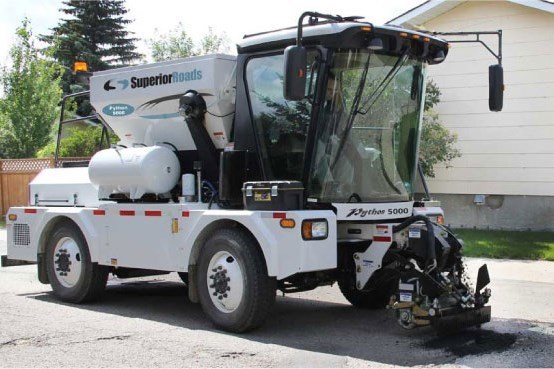A long-talked-about Python 5000 all-in-one pothole patching machine will soon be put to work on Greater Sudbury’s battered streets.
The machine, which will come with an annual operating cost of approximately $200,000, is expected to apply an additional 592 metric tonnes of asphalt to local streets per year.
The city’s elected officials unanimously approved the machine’s purchase price of $554,898 during Tuesday’s city council meeting.
At approximately $155,000 greater than the $400,000 they budgeted for earlier this year, city council agreed to pull the balance from reserves.
“In speaking to the vendor and other industry experts, the increase in the price was largely based on engine upgrades,” city road operations engineer Tony De Silva told council, adding that the brand new machine they’re purchasing has been upgraded to reduce emissions.
“It was determined that the return on investment is still favourable to the city when compared to the higher purchase price.”
The machine has a four- to six-month delivery timeframe, but De Silva said a demonstration unit might be available even sooner. Although staff will need to be trained on the machine, he said it would be ready to be put to work soon after arrival.
Python Manufacturing is based in Regina and has supplied Python 5000 machines to the City of Thunder Bay in 2017 at a cost of approximately $343,000 and the City of Timmins in 2020 at a cost of approximately $564,000.
The machines carry five tonnes of asphalt and are operated by one staff member in a cab, where they are able to complete the job from start to finish. The manufacturer advertises the machines as completing three times as much work as a crew would in the same amount of time.
A video demonstration by the manufacturer can be found by clicking here.
Meanwhile, the city has dispensed an average of 1,560 metric tonnes of pothole patching material over the past two winter/spring seasons using traditional methods, which consists of an asphalt crew of three to five staff and several pieces of equipment. A crew applies approximately four tonnes of asphalt per day.
Pothole patching has become increasingly important in Greater Sudbury during recent years, as underfunding has resulted in roads becoming substantially worse since 2007.
This, according to the city’s pavement condition index, which follows a scale of 0-100 to evaluate road condition based on roughness, rutting and structural condition, with 100 being a brand-new street with no problems.
In 2007, local roads — the city’s less-busy streets — had a pavement condition index ranking of 63 (good), while busier collector roads had a ranking of 68.1 (good) and busier arterial roads had a ranking of 72.8 (very good).
The current pavement condition index of local roads is now 47 (fair), while arterial and collector roads are 53 (fair).
In what Ward 4 Coun. Geoff McCausland described as being a “beast of a report” last month, the city noted that they would need to spend an additional $100 million per year to maintain city assets at their current state.
The average annual investment during the previous five-year period has been $26 million, which if maintained would degrade arterial and collector roads to an overall condition of 47 in 10 years, which is still considered “Fair.”
As for local roads, maintaining the current average annual investment of $9 million would degrade them to an overall condition of 34 (poor) in 10 years.
The city prepares pothole patching lists based on the information they collect during road patrols as well as phone calls to 311. More information on reporting a pothole can be found by clicking here.
Tyler Clarke covers city hall and political affairs for Sudbury.com.




